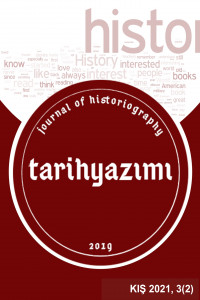Abstract
Tanzimat dönemi yaklaşık 150 yıllık aksaklıkların kabul edilerek giderilmesine yönelik radikal adımların atıldığı; sosyal, kültürel, askeri, ekonomi vs. pek çok alanda değişikliklere gidildiği bir dönem olarak bilinmekte ve bu çerçevede yapılan değişiklik, ıslahat ve modernleşme gayretleri tarihçiler tarafından farklı açılardan ele alınarak incelenmektedir. Tanzimat dönemi ıslahatlarında Batı’nın her açıdan ciddi bir etkisi görülmektedir. Bu durum Tanzimat ve ıslahatlarına karşı çıkanların en büyük tenkit noktasının “Batı” olmasına sebep olmuştur. Tanzimat’la birlikte güç ve otoritesini, ayrıcalıklarını kaybetmek istemeyenler, dini ve kültürel değerlere önem verenler “Batı”yı “ötekileştiren” bir dil geliştirerek Batı ve Tanzimat karşıtlığına girişmiştir. İnsanların kendilerini ve eylemlerini meşru ve haklı göstermek için başvurdukları en etkili yöntem “öteki” yaratmaktır. “Öteki”ne atfedilen her özellik “biz”in tahkimine katkı sağlar. Bu nedenle kendi konumunu, iktidarını, imkânlarını korumak isteyen birey, ötekini kendinin zıddı olarak kurgular. Tanzimat döneminde gelişen garbiyatçılığın epistemolojisi yakın geçmişte şekillenirken oryantalizmi (şarkiyatçılık) hem söylem hem de epistemik açıdan çok eskilere götürmek mümkündür. Tanzimat dönemiyle artan tercüme eserlerde, Batı’nın Doğu/Osmanlı/Müslüman tanımlaması ve bunlara ilişkin önyargılar, garbiyatçılığı beslemiştir.
Keywords
Tanzimat Ötekileştirme Tarihyazımı Oksidentalizm(Garbiyatçılık) Oryantalizm(şarkiyatçılık) Batılılaşma Modernleşme
References
- Reyhan, C. (2014), “Sunuş”, Memleket Dergisi, Cilt: 9, Sayı: 22, Temmuz 2014, s. V-VII.
- Reyhan, C ve Aksoy, C. (2019), Osmanlı-Türk Garbiyatçı Tarihyazımının Söylemi Üzerine Bir İçerik Analizi, Tarihyazımı- Journal of Historiography, Kış 2019, 1(2), s. 191-229.
- Reyhan, C. ve Aksoy, C (2020), “Osmanlı-Türk Tarihyazımında Garbiyatçı Yaklaşım”, Türk Tarihçiliğinde Tezler/Teoriler, (Ed. Ahmet Şimşek), İstanbul: Yeni İnsan, s. 311-341.
- Tekeli, İ. (1998), “Tarih Yazıcılığı ve Öteki Kavramı Üzerine Düşünceler”, Tarih Eğitimi ve Tarihte “Öteki” Sorunu 2.Uluslararası Tarih Kongresi, A. Berktay ve H.C. Tuncer (Editörler), 8-10 Haziran 1995. İstanbul: Tarih Vakfı Yurt. s. 1-7.
- Tosh, John. (2008), Tarihin Peşinde, (Çev. Özden Arıkan), İstanbul: Tarih Vakfı Yurt, 2008.
- Turner, B. S. (2003/2002), Oryantalizm, Postmodernizm ve Globalizm, İbrahim Kapaklıkaya (Çev.). İstanbul: Anka
Abstract
Tanzimat period when radical steps were taken to accept and eliminate long- lasting problems coming from 150 years ago was witnessed many reforms in the different areas; social, cultural, military, economic etc. Reforms, changes and modernization efforts have been discussed by historians from different perspectives. The influence of the West has been seen on the reforms of the Tanzimat in many aspects. This situation has caused opponents of Tanzimat and its reforms to see the “West” as a point of great criticism. The criticisms of various deteriorations starting from the pre- Tanzimat period and continuing in the Tanzimat period has turned towards and total or partial anti-Westernism and West by developing a discourse "othering" the "West". The most effective method that people applied to justify and legitimate themselves and their actions is to create the "other". Every characteristic attributed to the "other" contributes to the strengthening of the "we / the self". For this reason, the individual who wants to protect his/her position, power and opportunities characterizes the other (non-self) as the opposite of himself/herself. While the epistemology of the occidentalism that is ontologically developed in the Tanzimat period has shaped in the recent past, orientalism both in terms of discourse and epistemic goes long way back to very ancient times. The West's definitions about East/Ottoman/Muslim and its prejudices in the translated works that increased with the Tanzimat period has fed occidentalism.
Keywords
Tanzimat Period Othering Historiography Occidentalism Orientalism Westernization Modernization
References
- Reyhan, C. (2014), “Sunuş”, Memleket Dergisi, Cilt: 9, Sayı: 22, Temmuz 2014, s. V-VII.
- Reyhan, C ve Aksoy, C. (2019), Osmanlı-Türk Garbiyatçı Tarihyazımının Söylemi Üzerine Bir İçerik Analizi, Tarihyazımı- Journal of Historiography, Kış 2019, 1(2), s. 191-229.
- Reyhan, C. ve Aksoy, C (2020), “Osmanlı-Türk Tarihyazımında Garbiyatçı Yaklaşım”, Türk Tarihçiliğinde Tezler/Teoriler, (Ed. Ahmet Şimşek), İstanbul: Yeni İnsan, s. 311-341.
- Tekeli, İ. (1998), “Tarih Yazıcılığı ve Öteki Kavramı Üzerine Düşünceler”, Tarih Eğitimi ve Tarihte “Öteki” Sorunu 2.Uluslararası Tarih Kongresi, A. Berktay ve H.C. Tuncer (Editörler), 8-10 Haziran 1995. İstanbul: Tarih Vakfı Yurt. s. 1-7.
- Tosh, John. (2008), Tarihin Peşinde, (Çev. Özden Arıkan), İstanbul: Tarih Vakfı Yurt, 2008.
- Turner, B. S. (2003/2002), Oryantalizm, Postmodernizm ve Globalizm, İbrahim Kapaklıkaya (Çev.). İstanbul: Anka
Details
| Primary Language | Turkish |
|---|---|
| Journal Section | Research/Ttheoretical |
| Authors | |
| Publication Date | December 24, 2021 |
| Acceptance Date | December 21, 2021 |
| Published in Issue | Year 2021 Volume: 3 Issue: 2 |
Ethical Committee Approval
With the decision of ULAKBİM on February 25th, 2020, there is a condition that "All the disciplines of science (including social sciences), there should be an Ethical Committee Approval for research involving human and animal (clinical and experimental) separately and this approval must be mentioned in the article and it should be documented". The research conducted by quantitative or qualitative approaches which require data collection such as questionnaire, interview, observation, focus group study, the experiment is regarded under the aforementioned content.


